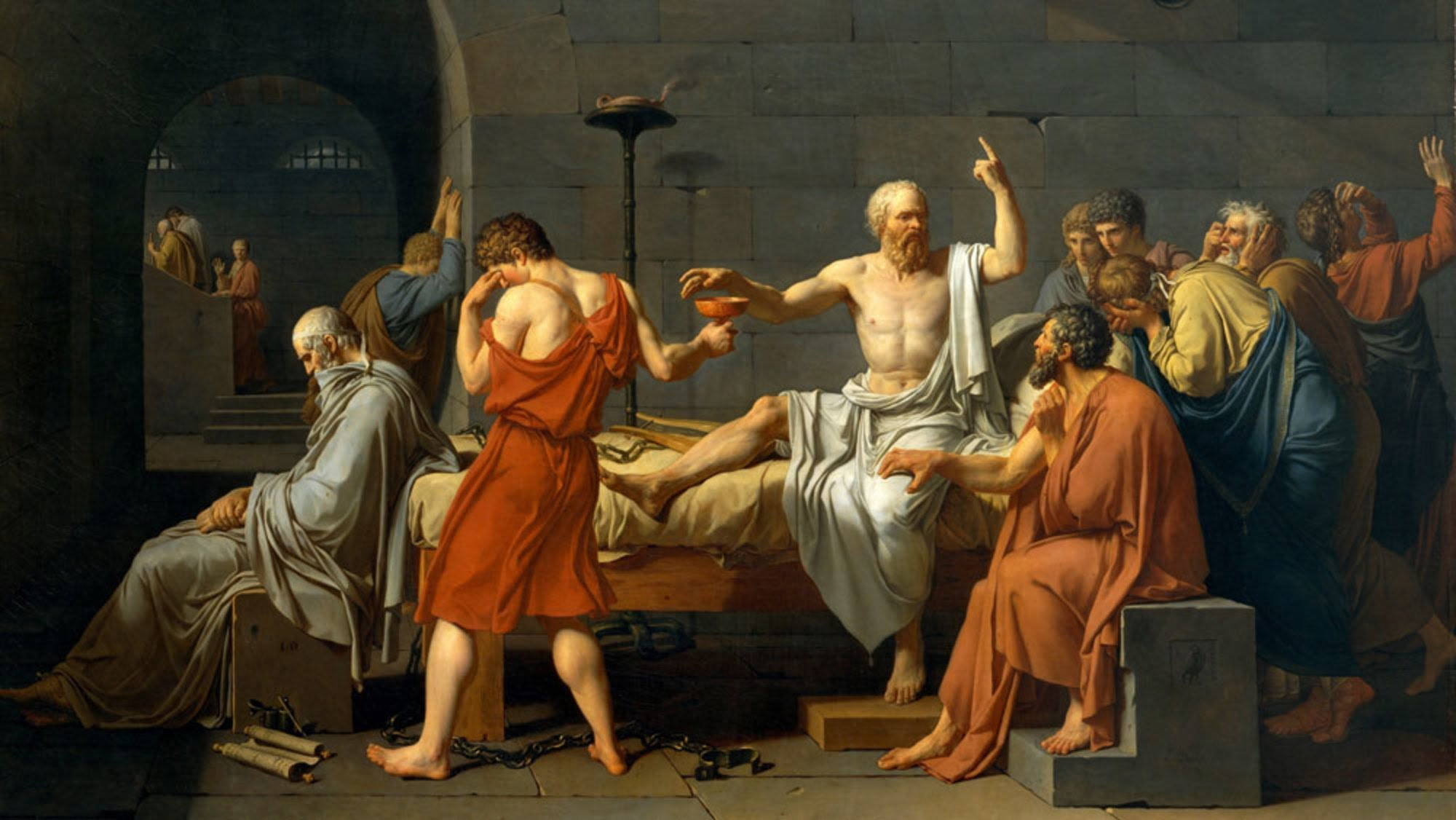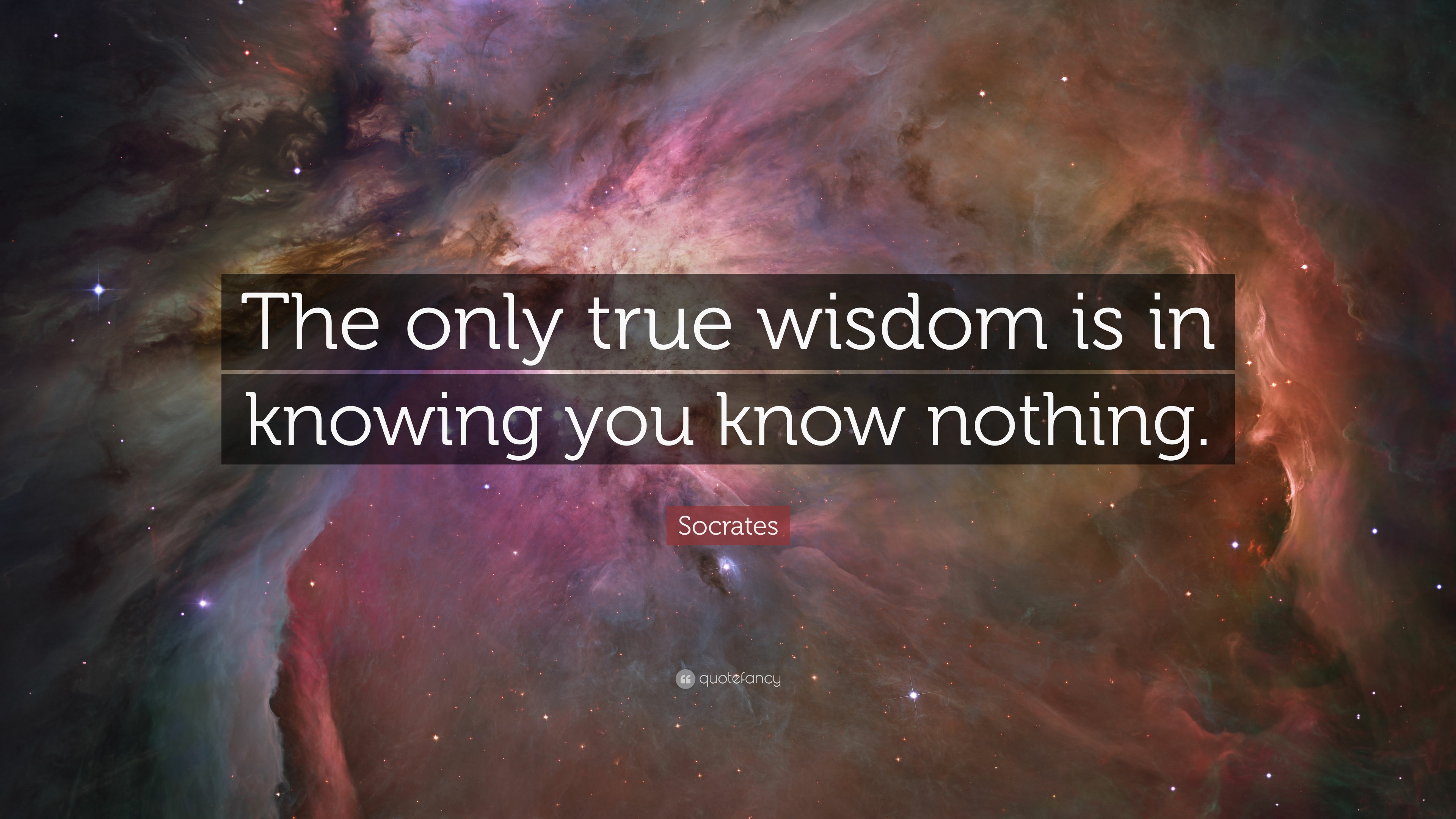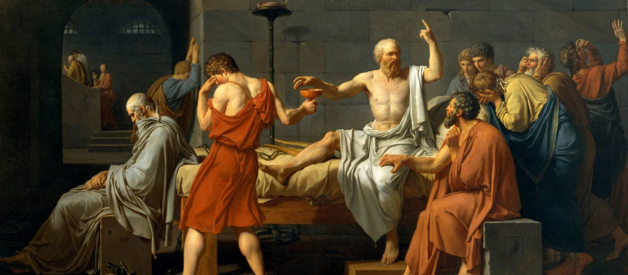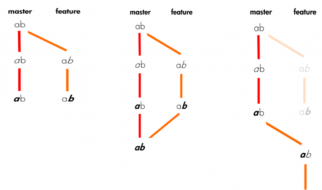 Jacques-Louis David, 1787: The Death of Socrates ? Athenian law prescribed death by drinking a cup of poison hemlock.
Jacques-Louis David, 1787: The Death of Socrates ? Athenian law prescribed death by drinking a cup of poison hemlock.
Socrates was by far one of the most important philosophers. However, he wrote no works of his own; therefore we come to know about Socrates? life and teachings through his student and friend Plato (427 BCE ? 347 BCE). The Apology, which was written by Plato, is undeniably one of the most important writings on Socrates? speech that he gave at his trial. Socrates was accused of impiety and corrupting the youth. In Plato?s Apology, Socrates repeatedly refers to a single God, and he refused to honour the Greek gods. He was defending himself and his conception of philosophy, however, Socrates was found guilty and he was sentenced to death.
We come to know of the phrase that ?an unexamined life is not worth living? towards the end of his trial. Socrates believed that the purpose of life was to grow spiritually, and philosophically; he argued that is was important to question and ?examine? your values and beliefs in order to determine if they were the correct ones. Socrates? way of examining people was by using his method of elenchus, in other words, the Socratic method. He believed that this method made people more aware of their ignorance and therefore, leads to humility and modesty.
One of Plato?s most important works is unquestionably the Apology, which is essentially a record of the speech Socrates gave at his trial. The trial took place in Athens in 399 BC. Socrates was not only defending himself, but was also defending his conception of philosophy. According to Socrates, virtue is fundamental and philosophy is an examination of ourselves towards virtue. He was accused of two things, which were corrupting the youth of Athens, and introducing a new God.
Early in Socrates? defence speech, he explained that his friend Chaerephon went to the oracle of Delphi and asked whether there was anyone wiser than Socrates. The oracle told Chaerephon that no one is wiser than Socrates. Socrates was baffled by this news as he found it very hard to believe that he was the wisest man. Socrates was aware of his own ignorance; he did not think he was wise. Thus, he decided to attempt to refute the oracle by finding someone who was wiser than himself. He spoke to people with different profession?s, such as politicians, poets, and craftsmen; however, he found that they only possessed ?human wisdom?. For example, the artisans were only wise in their art, but they lacked wisdom in what Socrates referred to as ?higher things? or ?human excellence.? Socrates found that:
?I am wiser than this man, for neither of us appears to know anything great and good; but he fancies he knows something although he knows nothing; whereas I, as I do not know anything, so I do not fancy I do.?
This therefore shows that because they all claimed they were wise this made them not so wise, whereas Socrates never claimed to be wise as he was conscious of his own ignorance about higher matters; thus he had a type of wisdom. Socrates therefore saw it as his responsibility to examine himself and others: that is to live the life of a philosopher.

Socrates provides us with a brilliant method, called the Socratic method, or the method of elenchus i.e. ?examination.? The Socratic method was not necessarily used to determine what is not true, but rather to determine what cannot be true. Thus, this method was used throughout the Socratic dialogues. For Socrates, this method of determining what is and is not true occurs always in the context of discourse and dialogue with others. The Socratic method always begins with Socrates asking his interlocutor ?what is? X?? For instance what is piety, or what is justice? This question is fundamentally after the essence of something; what is essential about these moral qualities such as courage. Socrates always proclaims ignorance; he always says he does not know anything. The interlocutor then offers an answer, however, the answer given is not what Socrates is looking for, as Socrates wants to know the essence of X. The interlocutor then provides a definition, however, Socrates discovers a contradiction with the answer given and shows that the definition cannot be right. This process carries on and Socrates continues to find inconsistencies by showing that the definitions cannot be true.
An example of this is in Plato?s Phaedo where Socrates asks Simmias ?Do we allow that there is such a thing as equality?? Each time an answer is given Socrates finds an inconsistency with Simmias? answer. This continues until Simmias runs out of definitions of equality, and so the discussion ends. Thus, ?Socrates here not only reminds Simmias of his ignorance but makes him painfully aware of his ignorance.? This is important because Socrates wanted people to ?examine? their lives and become aware of their own ignorance rather than thinking that they know things when actually they know nothing.
Although the Socratic method does not uncover what Socrates is actually looking for, it instead results in the interlocutors and Socrates himself being left in a state of aporia, in other words, a state of perplexity. Since the Socratic method often leaves people in a state of aporia (perplexity) it could be argued that there is no usefulness to be gained from it. However, Socrates talks about the benefit of perplexity and claims that it brings people closer to the truth:
?Sometimes ignorance is better than knowledge; he argues that the only truly valuable knowledge is the knowledge of the good, an authoritative knowledge that will correctly advise us when to use other goods and skills in our possession.?
Therefore, according to Socrates, the elenchus method is essential as it is a way of testing your lack of knowledge by examining your ideas and beliefs. So even though it does lead to perplexity, it makes you more conscious of your own ignorance and consequently it makes you a better person.
In conclusion, Socrates believed that philosophy was an improvement of the soul as it reveals our ignorance; therefore it is important to live an ?examined life.? He believed that you will most likely lead a miserable life if you do not question your beliefs and ideas. Socrates always claimed that he did not know anything; this resonates the essence of what Socrates is about. Wisdom is a sort of recognition of your own ignorance, thus Socrates knows that he is not wise; therefore he has a type of wisdom. At the end of his trial Socrates argued:
?If I say that it is the greatest good for a man to discuss virtue every day and those other things about which you hear me conversing and testing myself and others, for the unexamined life is not worth living for men, you will believe me even less.?
Socrates concludes that the life worth living is an examined life. ?Socrates himself said that he was a horsefly put by the gods ?on the flanks? of a ?sluggish? Athens in an attempt to ?wake it up??. In other words Socrates believed it was his duty to make people aware of their ignorance. He believed that if you do not examine your ideas and beliefs and test them to determine whether or not they are contradictory, and you live your entire life based upon those ideas; you will, according to Socrates, have lived a deceitful life; a life of false belief. This is the great danger that he wanted to tackle.
For Socrates, knowledge is the most valuable thing in life, however, he believed that it is better to seek knowledge and be conscious of your own ignorance than to claim knowledge that you really do not have.
Follow Thoughts and Ideas on Facebook: facebook.com/thoughtsandideas1


